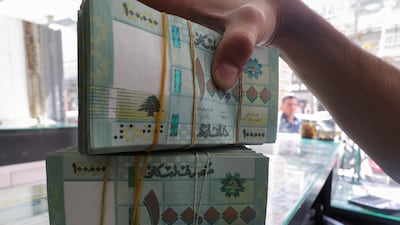Lebanon’s caretaker cabinet has approved a decision to raise public sector salaries and the nation's minimum wage in an effort to match the local currency’s rapid devaluation amid a shortage of US dollars reserves and growing public discontent.
The cabinet meeting, which lasted four hours, was held on Tuesday as hundreds of protesters from the public sector — civil servants, public school teachers, and retired soldiers — demonstrated outside the government building, promising they would not leave until salaries were increased.
“We came here to discuss the demands raised, which are justified,” caretaker Prime Minister Najib Mikati said at the beginning of the session.
He explained that the salary increases would be approved in proportion with available resources in the central bank’s dwindling reserves, and through revenue generated from customs.
The salaries of public sector workers were increased fourfold, the country's state news agency reported.
However, the increase was capped at a total 50 million Lebanese pounds a month, or about $500, and came with the stipulation that employees must attend at least 14 days of work each month.
The salary increase for the public sector will take effect from May 1.
The national minimum wage for the private sector was also raised to nine million pounds, or $90 at today’s market rate, up from 2.6 million pounds, or $26 a month.
An additional supplement of 4.5 million pounds ($45) was added to private sector salaries — an apparent bid to counter rapid inflation and currency devaluation.
The cabinet also increased transport allowances for civil servants and public teachers, who often lack the means to commute to work due to the exponential devaluation of their salaries.
However, the public sector expressed disappointment, arguing that the salary increase was not linked to the exchange rate and would soon be meaningless.
“They don’t meet our minimum requirements and our legitimate rights,” said a statement by the association of public sector bodies.
The association held the caretaker government and parliament responsible “for obstructing … the fate of the academic year and of official and university exams, and disrupting public sector institutions”.
The public sector will continue to demand a fixed exchange rate against the dollar, which will be used to calculate salaries and pensions, the association said. Health cover also remains a demand.
Since 2019, Lebanon has suffered from a protracted economic crisis that is considered by the World Bank to be one of the worst in the modern world.
The financial crash forced the country’s commercial banks to impose informal capital controls, locking people out of most of their savings.
More than 80 per cent of the population lives under the poverty line while the Lebanese pound has plummeted to a fraction of what it was once worth and inflation is in the triple digits.
The nation’s bankrupt public sector teeters on the verge of collapse, state utilities only supplying electricity for a few hours a day while government hospitals struggle with medicine shortages.
Public schools are intermittently closed during the school year owing to frequent teacher strikes, and ministries are barely running as employees struggle to commute to work.

